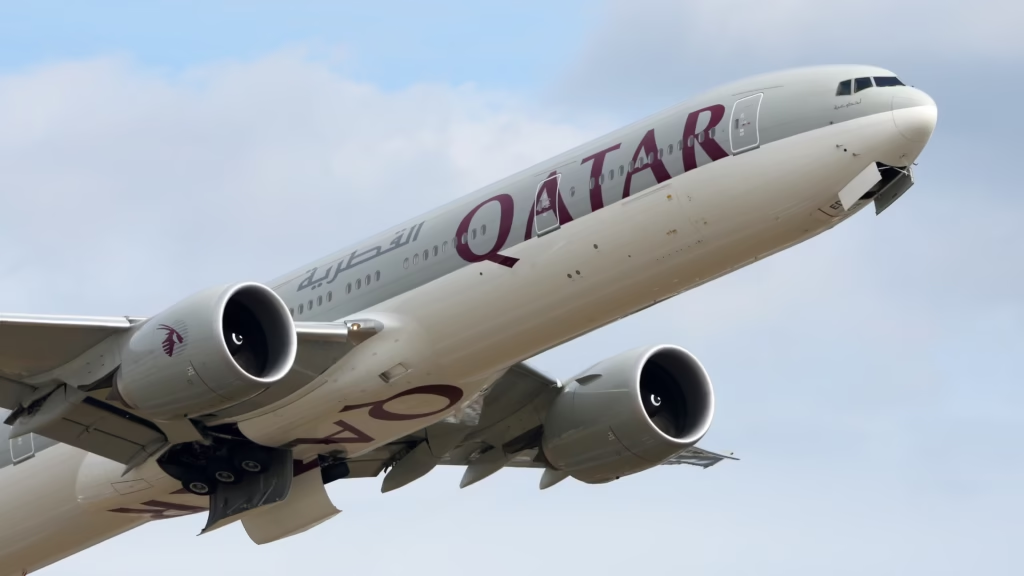Qatar Airways Plans a major move that could reshape its global operations for the next decade. The award-winning airline is preparing to place a large order of widebody aircraft between April and June of 2025, aiming to replace aging jets in its current fleet and meet growing travel demand.
According to senior leadership, the airline has already sent out a formal Request for Proposals (RFP) to both Boeing and Airbus. The goal is to secure between 100 and 150 new widebody aircraft—twin-aisle planes designed for long-haul flights. This upcoming purchase is part of Qatar Airways’ long-term fleet renewal strategy and signals confidence in the continued recovery and growth of international air travel.
Fleet Renewal and Expansion
Qatar Airways operates one of the world’s most modern fleets, but some of its aircraft are approaching the end of their service life. The airline is looking to gradually retire its older Airbus A330s and Boeing 777-200LRs. These jets, while reliable, are less fuel-efficient and more costly to operate than newer models currently offered by Airbus and Boeing.
To replace them, Qatar Airways is expected to choose from advanced widebody aircraft models such as the Airbus A350, Boeing 787 Dreamliner, and the Boeing 777X. Each of these planes offers better fuel efficiency, quieter engines, and longer range—all important features for global carriers.
Qatar Airways CEO, Badr Mohammed Al Meer, has made it clear that the airline is looking for the best long-term solution. Speaking to the press earlier this year, he highlighted that Qatar Airways is interested in not just the aircraft themselves, but also in the ability of manufacturers to deliver on time and support the airline’s future growth.

A History of Bold Orders
This is not the first time Qatar Airways has made a headline-grabbing fleet decision. In July 2024, during the Farnborough International Airshow, the airline placed an additional order for 20 Boeing 777-9 aircraft. This expanded its total order of Boeing 777X aircraft to 94, making Qatar Airways one of the largest customers for this next-generation plane.
These new Boeing 777-9 jets will be delivered with Qatar Airways’ cutting-edge Business Class product, the Qsuite Next Gen. The Qsuite is known for redefining premium travel with privacy doors, fully lie-flat beds, and adaptable spaces for families and business travelers alike.
The airline also maintains a strong presence in the Airbus camp, operating a large number of Airbus A350-900 and A350-1000 aircraft. These long-range jets have become the backbone of its long-haul routes, especially in recent years when efficiency and operating cost have been top priorities.
Boeing vs Airbus: The Battle for the Deal
As Qatar Airways reviews proposals from both aerospace giants, industry experts are watching closely. A deal of this size—potentially worth tens of billions of dollars—could tip the balance between Boeing and Airbus in the widebody market.
Both manufacturers have faced recent challenges. Boeing continues to work through production issues and regulatory scrutiny, particularly regarding its 787 and 777X programs. Airbus, while generally more stable, is also dealing with delays in its A350 production line due to supply chain pressures and labor shortages in Europe.
CEO Badr Mohammed Al Meer has expressed optimism that both companies will recover and stabilize production, but he also noted that Qatar Airways will carefully evaluate delivery timelines as part of its final decision. The airline wants to avoid delays that could disrupt future route planning and passenger service.
Strong Demand, Growing Competition
The timing of this potential order comes as international travel continues to rebound. Passenger demand across the Middle East, Asia, and Europe is surging, and Qatar Airways wants to be ready. With major events on the horizon, including the 2030 Asian Games in Doha and the continued growth of Qatar as a business and tourism hub, the airline needs a reliable, efficient, and modern fleet.
Qatar Airways also faces increased competition from regional giants like Emirates and Turkish Airlines, both of which are expanding aggressively. Staying ahead means not only flying to more destinations but doing so with aircraft that offer superior comfort, lower operating costs, and environmental efficiency.
By refreshing its fleet now, Qatar Airways is positioning itself to maintain its status as one of the world’s top carriers—both in terms of service quality and operational strength.
Environmental Focus and Innovation
Sustainability is another important factor in the decision-making process. Airlines around the world are under pressure to cut emissions, reduce fuel burn, and commit to greener aviation. Qatar Airways has already taken steps in this direction, including investments in carbon offset programs, more efficient flight planning, and retiring older, less eco-friendly aircraft.
The new widebody jets under consideration—such as the A350 and Boeing 787—offer significant improvements in fuel efficiency and carbon emissions compared to the older generation they will replace. The upcoming order will likely be one of Qatar Airways’ most environmentally focused fleet updates to date.
Final Decision Expected by Q2 2025
While the final decision has yet to be made, Qatar Airways expects to announce its widebody aircraft order in the second quarter of 2025. Until then, both Airbus and Boeing are expected to present their best offers, including pricing, delivery schedules, after-sales support, and customization options.
For Qatar Airways, the right choice will be about more than just numbers. It’s a decision that could define the airline’s future for decades to come, helping it maintain its reputation for excellence, innovation, and global leadership.
As the world watches, one thing is clear: Qatar Airways is preparing to make a bold move—one that will echo across the aviation industry and set the stage for the next chapter in long-haul travel.



